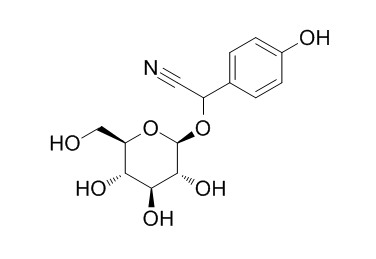Dhurrin
Reference standards.
Inquire / Order:
manager@chemfaces.com
Technical Inquiries:
service@chemfaces.com
Tel:
+86-27-84237783
Fax:
+86-27-84254680
Address:
1 Building, No. 83, CheCheng Rd., Wuhan Economic and Technological Development Zone, Wuhan, Hubei 430056, PRC
Providing storage is as stated on the product vial and the vial is kept tightly sealed, the product can be stored for up to
24 months(2-8C).
Wherever possible, you should prepare and use solutions on the same day. However, if you need to make up stock solutions in advance, we recommend that you store the solution as aliquots in tightly sealed vials at -20C. Generally, these will be useable for up to two weeks. Before use, and prior to opening the vial we recommend that you allow your product to equilibrate to room temperature for at least 1 hour.
Need more advice on solubility, usage and handling? Please email to: service@chemfaces.com
The packaging of the product may have turned upside down during transportation, resulting in the natural compounds adhering to the neck or cap of the vial. take the vial out of its packaging and gently shake to let the compounds fall to the bottom of the vial. for liquid products, centrifuge at 200-500 RPM to gather the liquid at the bottom of the vial. try to avoid loss or contamination during handling.
Food Chem.2023, 404(Pt A):134517.
In Vivo.2022, 36(3):1136-1143.
Molecules.2023, 28(19):6767.
J Am Soc Mass Spectrom.2021, 32(9):2451-2462.
Mol Immunol. 2016, 78:121-132
J Med Chem.2023, 66(6):4106-4130.
Cells.2023, 12(3):395.
Kaohsiung J Med Sci.2024, 40(3):280-290.
Biomed Pharmacother.2024, 174:116598.
Prev Nutr Food Sci.2024, 29(4):466-473.
Related and Featured Products
Nematology, 2012, 14(6):759-769.
Evaluation of the activity of dhurrin and Sorghum towards southern root-knot nematode Meloidogyne incognita (Kofoid et White) Chitw.[Reference:
WebLink]
The epidermal cells of leaf and roots of sorghum (Sorghum bicolor), sudangrass (S. sudanensis) and sorghum-sudangrass hybrids (S. bicolor × S. sudanensis) contain the cyanogenic glucoside Dhurrin, which can degrade into hydrogen cyanide (HCN), well known for its toxicity to many organisms, including nematodes.
METHODS AND RESULTS:
In vitro bioassays were carried out with the aim of evaluating the nematicidal and the nematistatic effects of Dhurrin concentrations on second-stage juveniles (J2) of Meloidogyne incognita, and the effectiveness of Dhurrin in decreasing or preventing hatching of M. incognita. Furthermore, Sorghum hybrid cv. Super Dolce 10, selected for its Dhurrin content, and Eruca sativa sel. Nemat were used in two glasshouse experiments to study the host-nematode relationship and the development of M. incognita life cycle in the roots. In the in vitro bioassays, Sorghum hybrid cv. Super Dolce 10 showed an inhibitory effect on hatching, a slow nematicidal effect on J2 and no nematistatic activity. In the glasshouse experiments, both Sorghum hybrid cv. Super Dolce 10 and E. sativa sel. Nemat proved to be a poor to non-host of M. incognita, with reproduction factor (R) always <1, compared with Solanum lycopersicum cv. UC82, an excellent host (R = 43). In both bioactive accessions two generations were completed in 15 weeks (four cycles in S. lycopersicum), but with the production of very few egg masses, while root infestation was also always very low, with gall index (G.I.) < 1, compared with S. lycopersicum (G.I. = 4).
CONCLUSIONS:
In this study, the effectiveness of E. sativa sel. Nemat in controlling M. incognita confirmed data from previous work.
Phytochemistry, 1987, 26(5):1546–1547.
Dhurrin, (−)-catechin, flavonol glycosides and flavones from Chamaebatia foliolosa.[Reference:
WebLink]
METHODS AND RESULTS:
The cyanogenic glucoside Dhurrin has been obtained in low amounts from the aerial parts of Chamaebatia foliolosa. Main flavonoids of the tissue were quercetin 3-O-glucoside, 3-O-galactoside, 3-O-rhamnoside and 3-O-arabinoside, whereas the flavones apigenin and hispidulin were detected as resin flavonoids deposited on the epidermis. The rare (−)-catechin was a minor constituent of the tissue extract.



